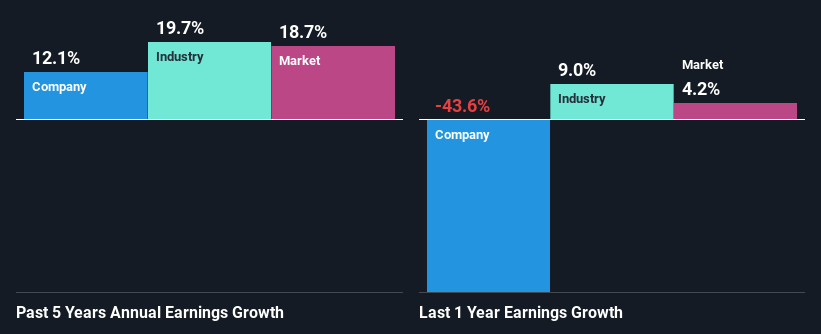Polskie Towarzystwo Wspierania Przedsiebiorczosci S.A.'s (WSE:PTW) Financials Are Too Obscure To Link With Current Share Price Momentum: What's In Store For the Stock?

Polskie Towarzystwo Wspierania Przedsiebiorczosci (WSE:PTW) has had a great run on the share market with its stock up by a significant 10% over the last week. However, we decided to pay attention to the company's fundamentals which don't appear to give a clear sign about the company's financial health. Particularly, we will be paying attention to Polskie Towarzystwo Wspierania Przedsiebiorczosci's ROE today.
Return on Equity or ROE is a test of how effectively a company is growing its value and managing investors’ money. Put another way, it reveals the company's success at turning shareholder investments into profits.
See our latest analysis for Polskie Towarzystwo Wspierania Przedsiebiorczosci
How Do You Calculate Return On Equity?
The formula for return on equity is:
Return on Equity = Net Profit (from continuing operations) ÷ Shareholders' Equity
So, based on the above formula, the ROE for Polskie Towarzystwo Wspierania Przedsiebiorczosci is:
9.1% = zł2.2m ÷ zł24m (Based on the trailing twelve months to June 2024).
The 'return' refers to a company's earnings over the last year. That means that for every PLN1 worth of shareholders' equity, the company generated PLN0.09 in profit.
Why Is ROE Important For Earnings Growth?
So far, we've learned that ROE is a measure of a company's profitability. Depending on how much of these profits the company reinvests or "retains", and how effectively it does so, we are then able to assess a company’s earnings growth potential. Assuming all else is equal, companies that have both a higher return on equity and higher profit retention are usually the ones that have a higher growth rate when compared to companies that don't have the same features.
A Side By Side comparison of Polskie Towarzystwo Wspierania Przedsiebiorczosci's Earnings Growth And 9.1% ROE
When you first look at it, Polskie Towarzystwo Wspierania Przedsiebiorczosci's ROE doesn't look that attractive. We then compared the company's ROE to the broader industry and were disappointed to see that the ROE is lower than the industry average of 16%. Polskie Towarzystwo Wspierania Przedsiebiorczosci was still able to see a decent net income growth of 12% over the past five years. We reckon that there could be other factors at play here. For example, it is possible that the company's management has made some good strategic decisions, or that the company has a low payout ratio.
Next, on comparing with the industry net income growth, we found that Polskie Towarzystwo Wspierania Przedsiebiorczosci's reported growth was lower than the industry growth of 20% over the last few years, which is not something we like to see.

Earnings growth is a huge factor in stock valuation. The investor should try to establish if the expected growth or decline in earnings, whichever the case may be, is priced in. By doing so, they will have an idea if the stock is headed into clear blue waters or if swampy waters await. One good indicator of expected earnings growth is the P/E ratio which determines the price the market is willing to pay for a stock based on its earnings prospects. So, you may want to check if Polskie Towarzystwo Wspierania Przedsiebiorczosci is trading on a high P/E or a low P/E, relative to its industry.
Is Polskie Towarzystwo Wspierania Przedsiebiorczosci Using Its Retained Earnings Effectively?
While Polskie Towarzystwo Wspierania Przedsiebiorczosci has a three-year median payout ratio of 84% (which means it retains 16% of profits), the company has still seen a fair bit of earnings growth in the past, meaning that its high payout ratio hasn't hampered its ability to grow.
Moreover, Polskie Towarzystwo Wspierania Przedsiebiorczosci is determined to keep sharing its profits with shareholders which we infer from its long history of paying a dividend for at least ten years.
Summary
In total, we're a bit ambivalent about Polskie Towarzystwo Wspierania Przedsiebiorczosci's performance. While no doubt its earnings growth is pretty respectable, the low profit retention could mean that the company's earnings growth could have been higher, had it been paying reinvesting a higher portion of its profits. An improvement in its ROE could also help future earnings growth. Until now, we have only just grazed the surface of the company's past performance by looking at the company's fundamentals. You can do your own research on Polskie Towarzystwo Wspierania Przedsiebiorczosci and see how it has performed in the past by looking at this FREE detailed graph of past earnings, revenue and cash flows.
New: Manage All Your Stock Portfolios in One Place
We've created the ultimate portfolio companion for stock investors, and it's free.
• Connect an unlimited number of Portfolios and see your total in one currency
• Be alerted to new Warning Signs or Risks via email or mobile
• Track the Fair Value of your stocks
Have feedback on this article? Concerned about the content? Get in touch with us directly. Alternatively, email editorial-team (at) simplywallst.com.
This article by Simply Wall St is general in nature. We provide commentary based on historical data and analyst forecasts only using an unbiased methodology and our articles are not intended to be financial advice. It does not constitute a recommendation to buy or sell any stock, and does not take account of your objectives, or your financial situation. We aim to bring you long-term focused analysis driven by fundamental data. Note that our analysis may not factor in the latest price-sensitive company announcements or qualitative material. Simply Wall St has no position in any stocks mentioned.
About WSE:PTW
Polskie Towarzystwo Wspierania Przedsiebiorczosci
Polskie Towarzystwo Wspierania Przedsiebiorczosci S.A.
Flawless balance sheet low.

